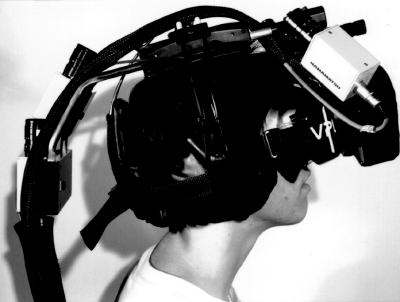
(Picture taken from Azuma's "Tracking Requirements for Augmented Reality", 1993)
The other day, Julian wrote an insightful critique of Augmented Reality, as a one of those glorious holy grails I referred to in my Lift09 presentation. Julian argued about how he wasn't convinced by the current iterations of this endpoint that has been presented in the past already, and why the meme is coming back nowadays.
While I share similar concerns about this very technology, I was more specifically intrigued by some of the comments, which dismiss Julian's claims and re-iterate that AR is *teh next big thing*. Let's have a look at the range of opinions:
- AR (or whatever technology) is inevitable and this is generally demonstrated by bringing a usual suspect to the table: Moore's law. Such a reference is what sociologist Bruno Latour calls an allie: a piece of theory/knowledge used to back up position. What other french sociologist (like Lucien Sfez) have shown is that the allies in the discourse about progress and technology are often recurring. In this sense, Moore's law can be described as a "usual suspect" in the discourse about the inevitability of technology. To put it shortly, it's generally very useful to bring this law out from the blue as you can prove almost everything wrt to increase and improvement. The law states that the number of transistors that can be placed inexpensively on an integrated circuit has increased exponentially (doubling approximately every two years). However, if you read it correctly, the law is about a "number of transistors" (then extended to cost per transistor, power consumption, cost per transistor, network capacity, disk storage and even "pixel per dollars"). What I mean here is that there is some sort of technological determinism implied by this law (not to mention its role in acting as a self-fulfilling prophecy!). See more in Ceruzzi's "Moore's Law and Technological Determinism: Reflections on the History of Technology".
- The next argument is generally that "technology" has changed. This is a fair one and it's indeed true that the technological underpinning are different now than 15 years ago ("1995 tech and 2009 tech are a wee bit different). However, it does not necessarily mean that the use of AR proposed 15 years ago will work in today's context. It's not because we have a "mobile internet" that we will end up with a "3D Twitter where people walk around with “what I’m doing” status updates hovering above their heads, or mood labels" as one of the comment express (hmm). Perhaps I would have reacted differently if the statement was "society has changed / we're more used to used mobile technology for XXX".
- Some people think that willing to avoid "tour-guide" AR scenarios on the basis that it's a loss of poetry in our way to live in our environment corresponds to being an old fart ("This reaction is about as annoying and as useless as people who, when confronted with ebook readers, say “but I like the smell of books and/or turning page"). This techno-geek reaction is quite funny and inadequate as it dismiss the wide range of desires and wants express by people. It's as if techno-enthusiasts could not understand the inter-individual variability and gave an opinion based on their sole interest. Doing lots of workshop about the future of mobile and locative technologies, I am often stunned by how much some people only rely on their own experiences and needs to think about the possibilities.
- Others say that you can be critical because it's "the idea has been around for ages" but under different forms signage like trail blazing). Nevertheless a sign on a rock is different than what is currently proposed on AR devices.
This is highly intriguing as it echoes a lot with the reactions I sometimes received in my talks about failures. There are also other opinions, not expressed in the comments posed after Julian's blogpost.For instance see the the "it's already here argument" that I encounter very often when I talk about the failure of social location-based applications (such as buddy-finder and place-based annotation systems). Lots of folks seem to by confused by the adoption of a service and it's mere existence. It's not because you have Latitude on your phone that social location-based services are "already here". Furthermore, I do admit that the we're moving slightly on the adoption curve thanks to mobile internet and better devices/applications (especially on the iphone) but it's still a super-small portion of human beings on Earth.
Perhaps the best conclusion for this post is to look at Adam's comment on Julian's post about AR:
"They get defensive, they hide behind rhetoric or jargon, they appeal to authority or the aura of inevitability, they call you names - you see it right here in these comments. This is what happens when technological literacy is allowed to reside solely in the class of people who benefit from the widespread adoption of technology, and why I believe we should work to extend such literacy as far outward into the far larger pool of “(l)users” as is practicable."
That said, a bit of reflexivity here wouldn't hurt. The arguments used here:
- also emerges from allies, although they're different: sociology and science-technology-society research.
- see technological success with a different lens, ore metric: the adoption of the device by a large number of people out of the techno-enthusiats sphere, who will then appropriate it in different ways (hence creating new usage). I can fairly admit that some people can have other measure of success.